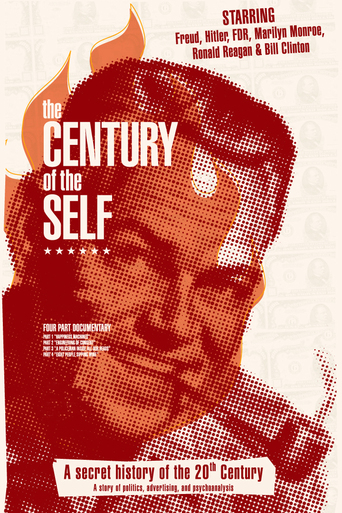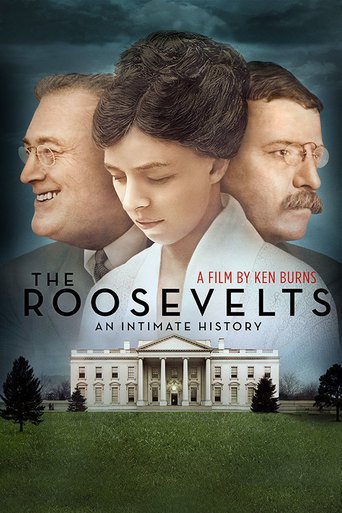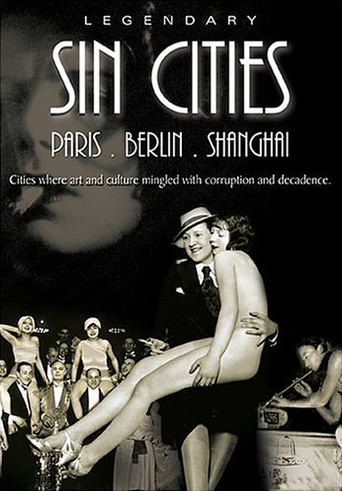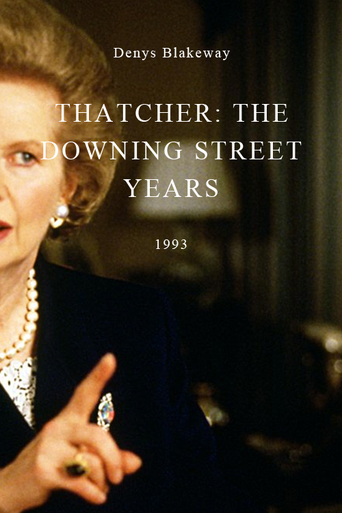

The Century of the Self (2002)
A documentary about the rise of psychoanalysis as a powerful mean of persuasion for both governments and corporations.
Watch Trailer
Cast


Similar titles
Reviews
This movie is a description of the gradual shift of democracy and business to cater towards the flourishing sense of self expression and self gratification following the great war. Edward Bernays, the nephew of Sigmund Freud championed the idea that the mob, was a gathering of unconscious, irrational desires and if left to themselves would destroy themselves in chaos. He believed that you had to tell them what they wanted. Idiots he called the mob, and by combining different symbols ingrained within the subconscious desires of the individual (He linked woman's freedom rights, with the rights to smoke cigarettes, which were at that time, only socially acceptable for men). He combined these desired symbols with products to make society conform around these capitalist desires. He was the king of capitalist propaganda because of this genius to control the mob. The film then followed the rise of the hippy culture and the growing need for self expression. As Freud believed that deep in the unconscious were bad desires, waiting to come out and wreak havoc on the individual the hippy movement expressed the opposite belief that if you allowed self expression to come out, freedom would be attained and beauty would flourish. Marketers operating under Bernay's old paradigm had trouble marketing to this counter-culture and thus was born the focus group. THe focus group involved sitting a bunch of people down and allowing them to express their deepest desires about a product. Not based on logic but how it made them feel. In this way they shifted from manipulating about how you felt about a product to designing products based around the self expression of the people. But perhaps this wasn't the end of manipulating as they found that the individual wanted something to make them feel like an individual. In this spirit of self expression, everyone wanted to be unique, and capitalists seized this new self-expression. The underlying theme being that, when you want someone to choose something a certain way, you play to their emotions not their rational. Bernays still being right in this as politics learned this move in the 50's as well. They learned that they had to discover the individuals desires not their rational to cater towards. Individuals said they would like to pay tax for welfare but when it came to voting time, they acted out of their desires. In this way Bill Clinton would get footage of him doing the activities that swing voters would find themselves doing, as they must have found that people wanted a president who could relate to them. It wasn't the change in policy that had such an effect on votes, but a change in catering to the persons emotions.
this is the best documentary i have ever seen, considering i have seen quite a lot of it. don't miss out on watching something that will change your life.I'll try not to spoil anything, but you must swear to watch this documentary. it'll change you to change the world!!!I mean, it tells you why you buy stuff, it tells you what is really going on with the government, it even has topless girls (artistic) and lesbian nuns (nice). plus all of the knowledge of yourself, its a win win situation. seriously don't hesitate, watch it now!! now!!Oh also, it explains a lot about life.
The Century of the Self contrasts whimsical film footage with an ominous narrative. It describes the way our ideas about human nature have changed and how the development of psychology has allowed social institutions to use these ideas to exert more and more control over people. This documentary focuses its attention on Sigmund Freud's family, especially his daughter and nephew, who exerted a surprising amount of influence on the way corporations and governments throughout the 20th century have thought about, and dealt with, people.At the end of the 19th century, Freud had a remarkable insight into human behavior. He believed that people were, often, unaware of what motivated them and didn't really know how they felt about things. He called this part of the mind, the part that people couldn't recognize, the subconscious. Being the cynic he was, Freud decided that the unconscious was filled with irrational, destructive, emotions which posed a danger to society. This was, unsurprisingly, a very unpopular point of view when Freud first wrote about it. At the time, people knew that they were, actually, divinely rational beings who were in complete control of themselves.But Edward Bernays, Freud's American nephew, was a little more receptive to his uncle's ideas, not because he was concerned with whether or not people were naturally destructive, but because Freud's ideas about people having strong emotions might help him convince people to buy things they didn't really need, and make a lot of money for him and his clients in the process. As long as his uncle wasn't completely wrong, then all Bernays had to do was associate emotional ideas with pointless products, and then consumers just wouldn't be able to help themselves. He was right, and his remarkable successes created a new industry, called public relations, which relied, almost entirely, on playing emotional games with people's heads. Worse, the terrifying events, fueled by Freudian propaganda, that began to occur in Germany during the depression convinced politicians that Freud had been even more right than they suspected. People's emotions were clearly dangerous and had to be controlled. Government agencies began using Bernays' PR techniques, and Himmler's propaganda methods, to convince people to suppress their emotions and conform to social norms. Anna Freud, Sigmund's daughter, and one of his most influential evangelists, even decided that she would see to it that her British nephew and niece were raised this way, as an example.However, one of Freud's students, Wilhelm Reich, eventually decided that Freud had been a little paranoid. Emotions weren't bad, people weren't evil, and the solution wasn't control and repression, but expression. Freud's daughter didn't like the sound of this, especially since her nephew and niece had since grown up to be severely troubled adults, providing an unnervingly good proof of his thesis. This Reich guy had struck a nerve, and so she ostracized him from the psychology movement. But Reich's ideas still caught on. And this didn't make either industry or government any happier than Anna. Neither of them knew what to do with the individuals that self-expression created. They had mass-produced products and policies that they sold through massive public-relations campaigns. Then, they noticed that self-expression gurus were organizing "focus groups" where people met to work out how they felt about things. All these institutions had to do was ask these focus groups the right questions, and they'd tell them how to sell people more products and policies than they had ever imagined possible. It turned out that all business and government really had to do was categorize people according to their emotional development and social attitudes and then play each category off of one other. Corporations could sell slight variations of the same mass-produced products to people, as long as they associated one variation with one group of people, and then convince them that this variation allowed them to express their true nature. And politicians no longer had to worry about sweeping social changes, they could just play off one segment of voters against another and then sit back and watch all the consumers obsessively buy things, oblivious to social problems. Documentarian Adam Curtis' bewildering collage of film clips, pop-music snippets, and interviews helps portray the slightly absurd and surreal cynicism and manipulation practiced by the 20th-century's supposedly enlightened business and political leaders.
I am going to buy this movie on DVD as soon as I can get it.It tells of the battle of good and evil not in abstract terms but in concrete facts.It tells of one group of people who see human beings as basically weak and must be controlled.Another group of people see human beings as basically good and that society must work to bring out the best in humanity.Then there is the group (the DEVIL - male and female) - the greedy, power hungry, slime balls that coop the good nature of the human being for profit and power.











